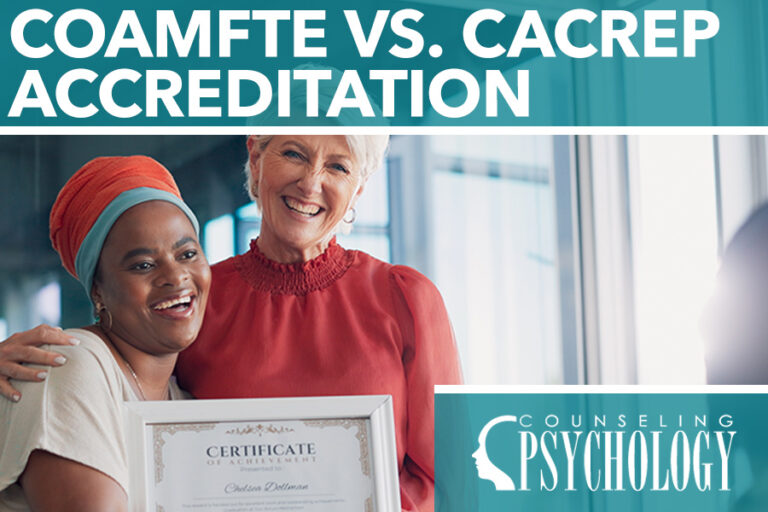COAMFTE vs. CACREP Accreditation: What’s the Difference?

When researching graduate programs in counseling and therapy, prospective students often encounter two major accreditation bodies: COAMFTE and CACREP. Understanding the differences between these credentials is crucial for making informed decisions about your education and future career path. This comprehensive guide breaks down the key distinctions, helping you determine which accreditation aligns best with your professional goals.
Understanding Accreditation in Mental Health Education
Accreditation serves as a quality assurance mechanism for educational programs, ensuring they meet established standards for curriculum, faculty qualifications, and student outcomes. In the mental health field, program accreditation impacts licensure eligibility, job opportunities, and the scope of practice graduates can pursue.
What is COAMFTE?
COAMFTE (Commission on Accreditation for Marriage and Family Therapy Education) is the specialized accrediting body for marriage and family therapy education programs. Established by the American Association for Marriage and Family Therapy (AAMFT), COAMFTE accreditation focuses specifically on training programs that prepare students to become marriage and family therapists.
Key Features of COAMFTE Accreditation:
- Primary Focus: Marriage and family therapy education with emphasis on systemic perspectives
- Theoretical Foundation: Family systems theory, viewing problems within the context of relationships
- Program Types: Master’s, doctoral, and post-graduate clinical training programs in MFT
- Governing Organization: American Association for Marriage and Family Therapy (AAMFT)
- Practice Emphasis: Relational and systemic therapy approaches
COAMFTE programs specifically prepare graduates for careers as Marriage and Family Therapists (MFTs), who are trained to address mental health issues within the context of family systems and relationships.
Learn more about MFT degree programs.
What is CACREP?
CACREP (Council for Accreditation of Counseling and Related Educational Programs) accredits programs in counseling and related fields. This broader accreditation encompasses multiple counseling specialties, including clinical mental health counseling, school counseling, rehabilitation counseling, and more.
Key Features of CACREP Accreditation:
- Primary Focus: Professional counselor education across multiple specializations
- Theoretical Foundation: Individual-focused counseling theories with broader applications
- Program Types: Master’s and doctoral programs in counseling and counselor education
- Governing Organization: Independent accrediting agency recognized by the Council for Higher Education Accreditation
- Practice Emphasis: Individual-focused counseling approaches with specialization options
CACREP programs prepare graduates for careers as Licensed Professional Counselors (LPCs), Licensed Mental Health Counselors (LMHCs), school counselors, and other counseling specialties.
Learn more about counseling degree programs.
COAMFTE vs. CACREP: Comprehensive Comparison Chart
| Aspect | COAMFTE | CACREP |
| Full Name | Commission on Accreditation for Marriage and Family Therapy Education | Council for Accreditation of Counseling and Related Educational Programs |
| Founded | 1978 | 1981 |
| Primary Career Path | Marriage and Family Therapist (MFT) | Licensed Professional Counselor (LPC) |
| Theoretical Orientation | Family systems approach | Individual counseling with various theoretical orientations |
| Program Focus | Relationships and systemic therapy | Mental health counseling with multiple specialization options |
| Typical Degree Titles | MA/MS/PhD in Marriage and Family Therapy | MA/MS/PhD in Counseling or specific counseling specialty |
| Clinical Hours Required | 500 direct client contact hours (master’s level) | 600 clock hours of supervised fieldwork (master’s level) |
| Relational Hours Required | At least 200 hours with couples or families | No specific relational hour requirement |
| Core Curriculum Areas | MFT theories, systemic assessment, couples therapy | Counseling theories, human development, career counseling |
| Specializations | Primarily focused on MFT with some subspecialties | Multiple tracks (clinical mental health, school, career, etc.) |
| Number of Accredited Programs | Approximately 120 programs | Over 880 programs |
| Licensure Portability | Strong for MFT licensure across states | Strong for LPC/LMHC licensure across states |
| Average Program Length | 2-3 years (master’s level) | 2-3 years (master’s level) |
| International Recognition | More limited | More widespread |
Key Differences in Curriculum and Training
COAMFTE Programs Emphasize:
- Family Systems Theory: Viewing individuals within the context of their relationships and family dynamics
- Relational Assessment: Evaluating problems through relationship patterns and family structures
- Couples and Family Therapy Techniques: Specific interventions for relationship dynamics
- Systemic Thinking: Understanding how changes in one part of a system affect the entire system
- Relational Ethics: Navigating the unique ethical challenges of treating multiple related clients
CACREP Programs Emphasize:
- Individual Assessment: Psychological evaluation and diagnosis of mental health conditions
- Individual Counseling Theories: Various theoretical approaches to counseling individuals
- Human Development: Understanding developmental stages across the lifespan
- Career Counseling: Helping clients with vocational and career decisions
- Specialized Counseling Areas: Options to focus on specific populations or settings
Career Implications and Licensure Considerations
Your choice between COAMFTE and CACREP accreditation should align with your career goals:
COAMFTE is Ideal If You Want To:
- Practice primarily as a Marriage and Family Therapist
- Work specifically with couples, families, and relationships
- Apply family systems theories in your clinical practice
- Meet MFT licensure requirements most efficiently
- Join the American Association for Marriage and Family Therapy
CACREP is Ideal If You Want To:
- Practice as a Licensed Professional Counselor
- Work in diverse counseling settings (schools, agencies, private practice)
- Have flexibility across multiple counseling specializations
- Meet LPC or LMHC licensure requirements most efficiently
- Join the American Counseling Association
Licensure Portability Considerations
Both accreditations facilitate licensure portability, but in different professional tracks:
- COAMFTE graduates typically pursue Marriage and Family Therapist (MFT) licensure, which is recognized in all 50 states with varying requirements.
- CACREP graduates typically pursue Licensed Professional Counselor (LPC) or Licensed Mental Health Counselor (LMHC) credentials, also recognized nationally with state-specific requirements.
Program Availability and Accessibility
CACREP-accredited programs are more numerous, with over 880 accredited programs nationwide compared to approximately 120 COAMFTE-accredited programs. This difference in availability may impact your program selection based on geographic location and delivery format preferences.
Making Your Decision: Practical Considerations
When choosing between COAMFTE and CACREP programs, consider:
- Career Goals: Which professional identity aligns with your vision?
- Theoretical Preference: Do you prefer systemic or individual-focused approaches?
- Population Interest: Do you want to work primarily with relationships or individuals?
- State Requirements: Check specific licensure requirements in your intended practice state
- Program Accessibility: Consider geographic location and program delivery options
Both Paths Lead to Rewarding Careers
Both COAMFTE and CACREP accreditations represent high-quality educational standards in mental health training. The “best” choice depends entirely on your professional goals and interests rather than one being superior to the other. Some institutions even offer dual-accredited programs for students seeking maximum flexibility.
By understanding these key differences, you can make an informed decision that aligns with your professional aspirations in the counseling and therapy fields.



